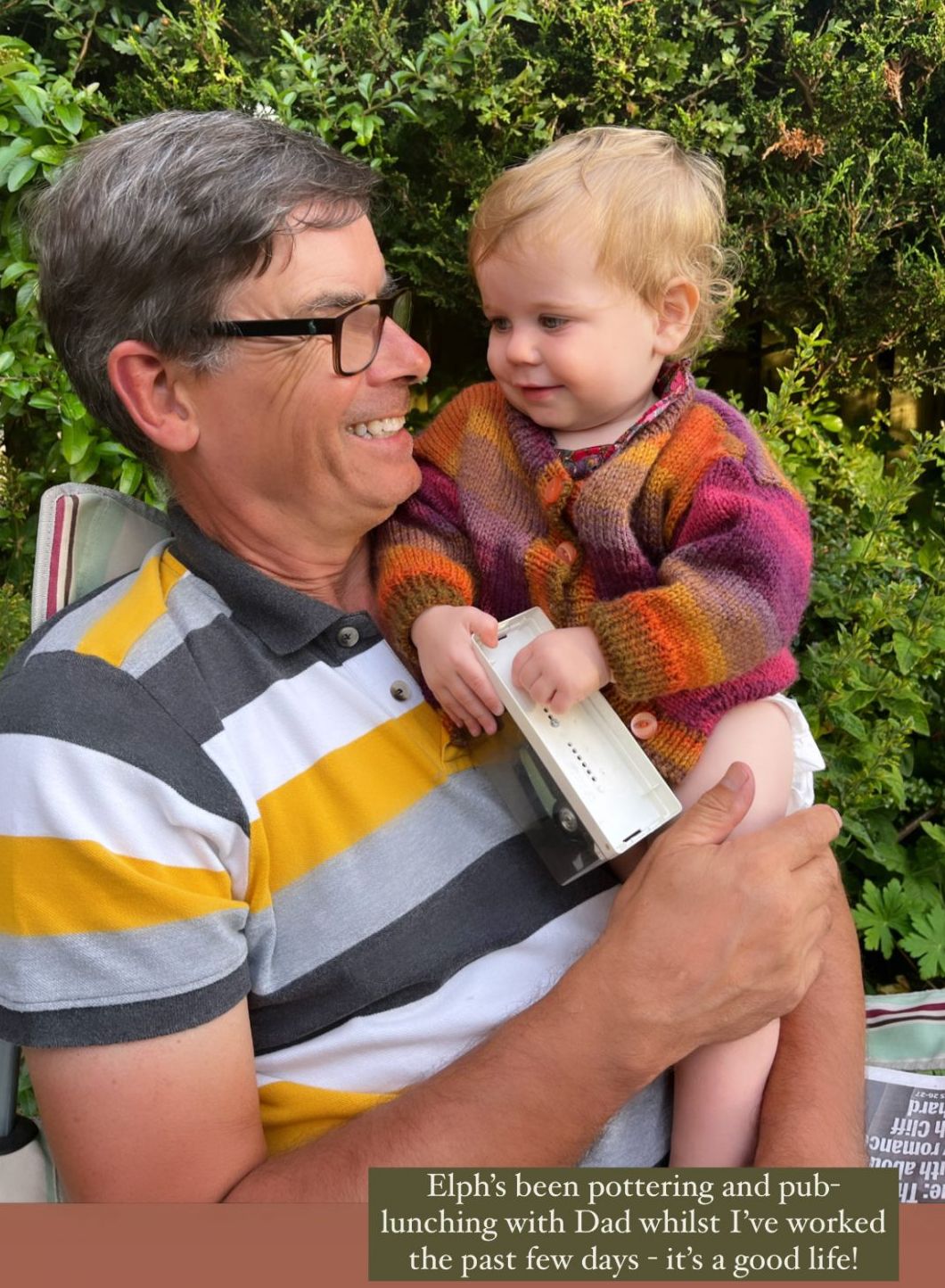Returning to work after maternity leave is not an easy task. Writer Emma Winterschladen explores how she and the women around her relied on different support networks to enable them to return to work. As the saying goes: it takes a village.
Last week I found myself sitting alone on a train to Brighton, looking out the window and wondering what my toddler was doing. I was travelling to a three-day illustration job, and it was the first time I’d left her for one night, let alone three. I wasn’t worried, though – there were no pangs of ‘Will she be ok?’ – just a happy curiosity, and the remainder of the journey was spent daydreaming about having a hotel room (and bed) to myself.
Grandpa Robin was the reason I knew she’d be OK. My dad would be looking after my daughter, having cared for her regularly, one-on-one, since she was born 17 months ago. Despite living over 300 miles away from us, in Newcastle, he has become a significant secondary caregiver for Elphie. It’s a relationship that often feels closer to a third parent.
It’s not the new motherhood I imagined when growing up – I always assumed it would be my lovely mum heading up grandparent duties. But Mum died when I was 16 – she was 45 – so any hopes of her cooing, cuddling and caring for my future child were lost when she was.
Before my first daughter was born, I had no idea what a pivotal role Dad would play, and the extent to which his help would facilitate a return to my work in that first year. We have at times gone up to stay with Dad for week-long stints, which has allowed me to take on freelance projects that the inflexibility of paid-for childcare would never have allowed for.
Dad may be at the heart of my ‘village’, but he’s not the only one in it. There’s my parents-in-law, who put me and Elph up for days on end, caring for her as I dip in and out to work. There’s my Aunty Anne, who travels up from Scarborough every time we are up north to help her brother. There are the ‘other mothers’ I have cultivated in the years since Mum died – one of whom, a friend’s mum, now lives a short drive away and kindly offers to babysit when needed. Then there are the fellow new mums I’ve met along the way, mostly at the mum and baby yoga classes. It was one of these mums who offered to look after Elph, along with her own son, as I sat in the next room working on a project. Another two friends would pop around during their lunch breaks and after work, taking my daughter for long walks along the canal, gifting me precious pockets of time to work.

Intergenerational living
For Naomi Boles, founder of social enterprise Boles Bakery in Aylesbury, her first year of motherhood would not have been possible without the support of her mum, mother-in-law and grandmother.
“Growing up, my grandmother lived close-by and was very involved in raising me. I always expected this would be how I’d bring up my own children,” says Naomi. And so it was for her first child. “In that first year, I would turn up at my grandmother’s house and she would have the bed ready-made for me to climb into and nap while she looked after Ella.” The support also meant that when Naomi choose to leave her full-time role, due to a lack of flexibility that meant she was effectively paying to go to work (even with a working partner and childcare help), she had the freedom to set up her own business.
Today, with three children, Naomi no longer lives as close to her mother and grandmother, but their practical and emotional support is still invaluable. “Whenever Mum comes up to stay and look after the children, my grandmother will fill the car with our favourite foods – salt fish fritters and fried chicken,” Naomi shares. Day-to-day, she now relies heavily on an established network of mum friends, who help fill in childcare gaps with drop-offs, pick-ups and last-minute babysitting, often needed when she is working on a big baking job.
From village to island
But what about those who don’t have family support to lean on? Jess and Charlotte live in Brighton with their two-year-old son, Ollie. They have found out the hard way what happens when the ‘village’ you expected doesn’t work out as planned.
“We went into parenthood thinking we’d have family support to help,” says Jess. Sadly, the reality has been very different – from a lack of consistency in promised childcare to misaligned values about the way Ollie is looked after.
“Once I went back to work, after eight months, the situation became stressful for us all,” says Jess. “We ended up feeling guilty and uncomfortable that we were relying so heavily upon my mum, who was not coping well with the realities of looking after a young toddler.” Ultimately, Jess and Charlotte decided paid-for childcare was the only sustainable option – despite the financial implications.
Creating the community you need
Tessa Clemson, a yoga teacher from Lancashire, sees first-hand how fraught this transition back to work can be. “Many of the mums at my studio are at various stages of their ‘back-to-work’ journey and I don’t think it’s spoken about enough what a challenging time it can be,” she says. “It’s not just the logistics of childcare, it’s the mental load of balancing work and mothering.”
This is where she believes community plays an important part. “Having a safe space to talk about it with those going through a similar time does help,” she adds. “So does prioritising time that isn’t working or caregiving – be it a yoga class, a book club, a local meet-up or just a walk with a friend.”
You may also like
A third of women say taking on childcare responsibilities has had a negative effect on their career progression
With a new baby due in the autumn, both Jess and Charlotte are having to reimagine what their future village may look and feel like for their growing family. “I love the idea of living in community with our close friends and chosen family – all of us intimately intertwined in the day-to-day of each other’s lives,” says Charlotte. “But I know this isn’t realistic, and we’re all so busy and scattered, so I’d like us to priorities finding like-minded parents at a similar stage to us, who we can build meaningful connections with.”
As I too look forward to welcoming our second child in the autumn, I’m also thinking about what my new ‘village’ will look like. A move up to Northumberland will see me living physically closer to Dad for the first time in 15 years, with all the practical and emotional support that will entail. But I’ll also be far away from both my established friendship group and all the new parenting friends I’ve made down south.
Perhaps the key lies in just remembering that the reason raising children feels hard sometimes, is because it is hard – and we weren’t meant to do this alone. Taking steps to surround myself with people who understand that can only be a good place to start.
Baby On The Brain – a Stylist podcast about the challenges of pregnancy and parenting – is back for a second series. As many of you will know, the first series was about pregnancy and how that changes every part of a woman’s life – even in the smallest ways. This second series is about returning to work after maternity leave.
This week’s episode is all about the first year back at work after having a baby. Stylist’s Felicity Thistlethwaite, her co-host Ashley James and their guest Tobi Oredein discuss at length what their return to work looked like, the challenges they faced and how they overcame them.
Images: Getty; Emma Winterschladen
Source: Read Full Article
